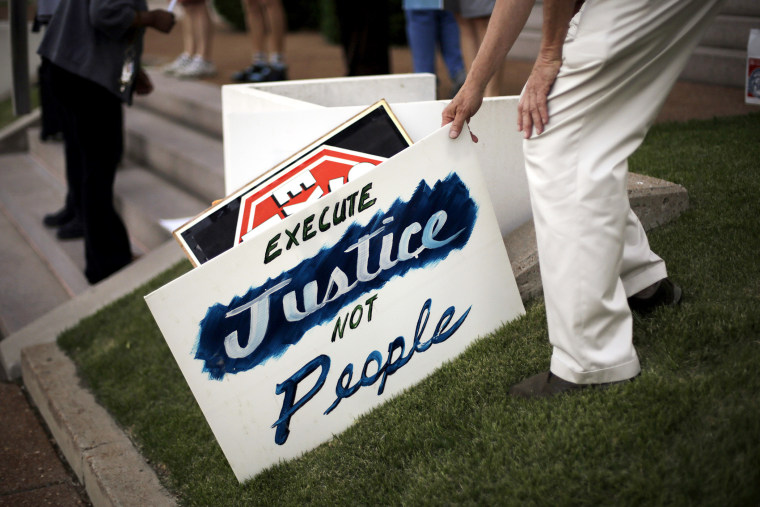Missouri carried out its seventh execution this year, less than two weeks after a botched execution in Arizona raised questions about lethal injection and capital punishment in the U.S.
The Missouri Department of Corrections said Michael Worthington, 43, was pronounced dead at 12:11 am CDT, the Associated Press reported early Wednesday. Missouri Attorney General Chris Koster confirmed the inmate's death. Worthington was convicted in 1995 of raping and murdering a woman in suburban St. Louis.
His execution was the first since July 23, when it took almost two hours and 15 injections of a lethal drug cocktail to execute Joseph Wood in Arizona. Wood’s execution was the third such death this year to veer far from what has been considered normal procedure for lethal injection executions.
A federal appeals court denied an appeal from Worthington's attorneys on August 1 to halt the execution. They argued that the inmate had a right to know details of the drugs that would be used to put him to death, but the appeal was unsuccessful. The Missouri Supreme Court denied a similar request on July 31. Both the U.S. Supreme Court and the Governor of Missouri both denied last minute appeals by Worthington.
In an interview with the Associated Press last week, U.S. Supreme Court Justice Ruth Bader Ginsburg declined to make any predictions about what the court might do in the wake of Wood’s prolonged death – an execution the court upheld. “Your crystal ball is as good as mine,” Ginsburg said.
This year, Missouri is set to carry out its greatest number of executions since 1999, and it currently sits just behind Florida and Texas on the list of most active death chambers in the United States. Missouri has also avoided the sort of controversy other states have faced because it employs a one-drug protocol that has been in use since 2011.
Other states have been experimenting with different combinations of drugs, most of them previously untested, after drug companies stopped allowing states to use their products to kill humans. These untested drug cocktails, many death penalty opponents argue, have raised the risk of visible suffering and have led many inmates to challenge their death sentences under the Eighth Amendment, which protects against cruel and unusual punishment.
A bipartisan panel recommended a massive overhaul of the U.S. death penalty system in May. In addition to calling for better training for officials carrying out death sentences, transparency about execution protocols and changes to the appeals process, the panel called on states to rely only on one-drug lethal injection protocols and to use only drugs approved for use in humans.
The drug shortages have also led states to turn to so-called “compounding pharmacies,” which custom mix drugs for specific purposes. Missouri relies on compounding pharmacies to supply it with the pentobarbital it uses in executions.
Despite the questions raised over what drugs are being used to execute inmates, the qualifications of the people who carry out death sentences, and how states are getting their lethal drug combinations, state corrections departments continue to defend their methods. During the 26 minutes it took Dennis McGuire to die during his execution on January 16 in Ohio, he reportedly gasped repeatedly, but officials eventually ruled that he did not suffer.
After Oklahoma corrections officials failed to improperly insert an IV into inmate Clayton Lockett on April 29, witnesses reported that he groaned and squirmed for nearly 45 minutes before dying of a heart attack. Gov. Mary Fallin defended the execution, saying in a statement that “the state lawfully carried out a sentence of death.” Following Lockett’s death, Oklahoma suspended all executions until a full review of the case and the state’s death penalty procedures could be completed. And in May, a federal judge ordered a stop to executions through August in Ohio.
Arizona officials disputed reports that Wood gasped during the time it took for him to die, but Gov. Jan Brewer promised an internal review of the execution.
On August 1, Attorney General Eric Holder spoke about the ongoing fight over death penalty drug secrecy and said inmates should have access to more details about their impending deaths. In an interview with PBS NewsHour, Holder said, “For the state to exercise that greatest of all powers, to end a human life, it seems to me, just on a personal level, that transparency would be a good thing, and to share the information about what chemicals are being used, what drugs are being used.”
